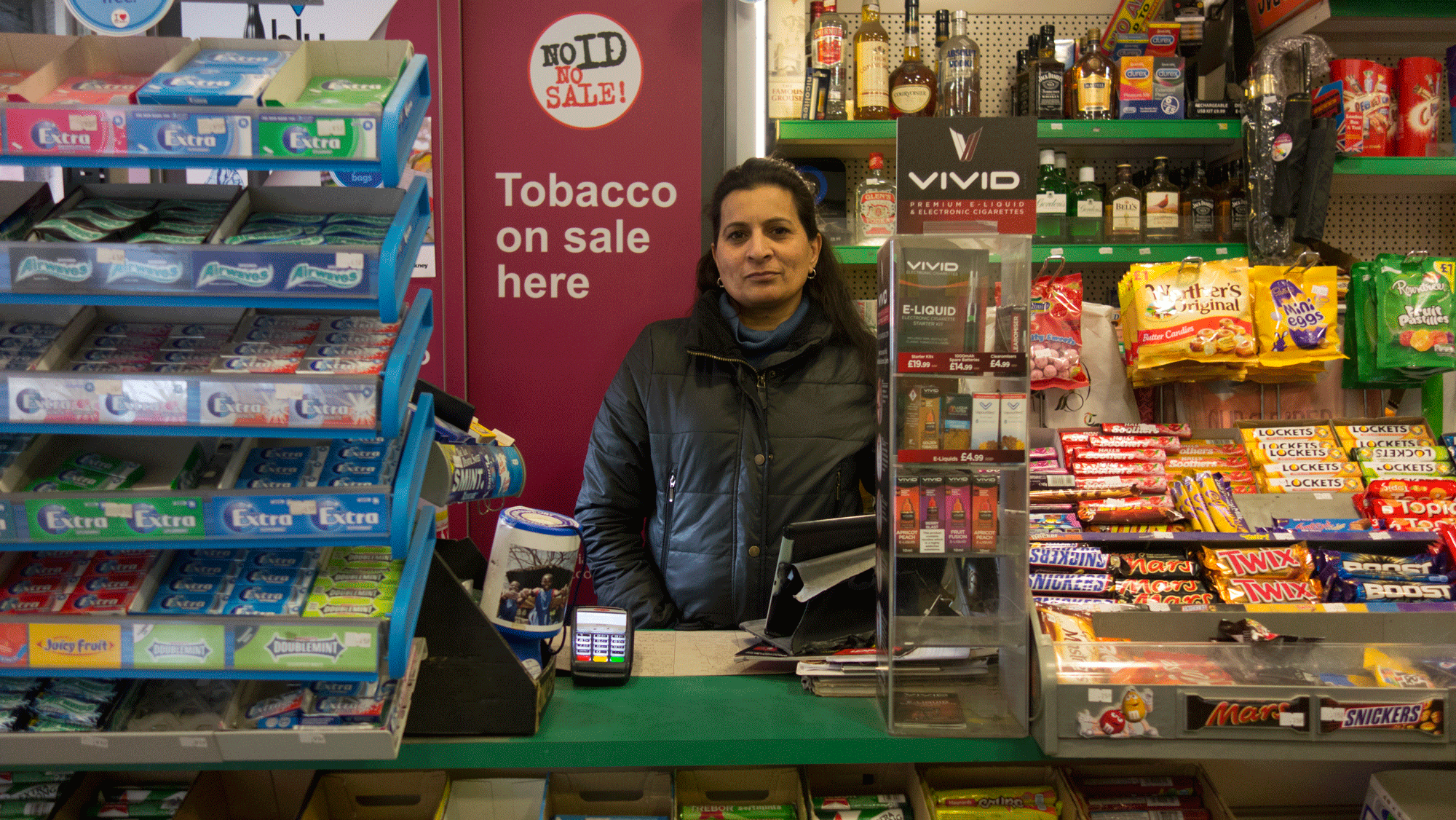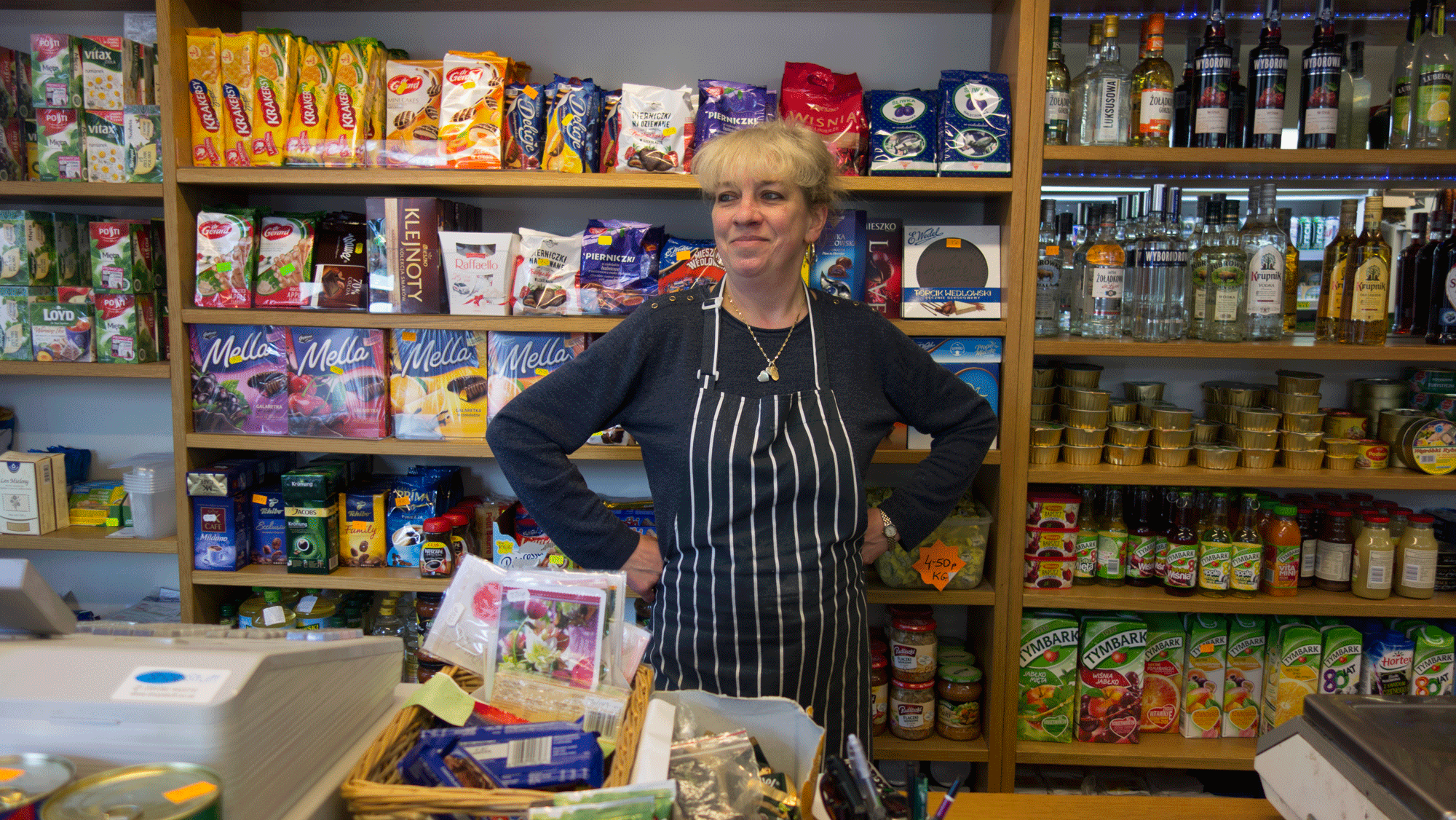(Photos by the author)
If the mark of a civilised society is how women are treated within it, then how civilised is the UK? And does that same civility apply to women who aren’t born and raised here?
Videos by VICE
To find out, I spoke to a number of women who have moved to the UK to get their take.
Gita Karena, 52, make-up artist, from India, now lives in Manor House

I don’t actually work here [Gita gestures around her] – I’m helping out a family friend for the day. I’m a make-up artist. I do brides and I am so privileged to do that because it’s a very important day of a women’s life. With Indian make-up there are more colours on the face; it’s all plush red lips, sunken dark liner. English make-up is about subtlety; you want to look like Kiera Knightly – soft champagne shimmer or blushing pink cheeks, because your skin is so light.
In South India you bump into your friends on the street and chat for hours. There is a much stronger sense of community. In England you have to text someone for days to prepare them for your arrival, otherwise it’s impolite.
When I came here, in 1986, I didn’t even have to look for employment – my husband was in the Co-op and a man approached him and asked if I wanted a job. But then I guess it was a bit easier for me because I studied English at university, whereas other women come here and they don’t know the language. They are a lot more isolated; they often end up locked up in the house cleaning. When I was home in India, none of the women in my family worked; my dad owned his own business. But he said to me, “I like women working – they need to take care of their family. That is important.” He is very proud of me.
I relive home through my kids. They are all grown-ups now, but they have never been to India. I’m from the south so I make rice and dosa pancakes with them. I tell them about the freedom you get back home: kids sit with their legs hanging off the pavement and they are really useful. If you want something from the shop just tell them and they will run there for you because they know they can buy sweets for themselves when they get to the shop. There is a culture of fear here. People worry their kids are going to get scooped up by a paedophile, so they lock them up with video games.
Amandine, 31, illustrator, from France, now lives in Bethnal Green
The behaviour of guys towards women is much better here, but it’s important to remember that London is not England. My boyfriend freaked out and grabbed my arm when we were in Leeds Bus Station because there were lots of drunken men falling about with Greggs coming out of their mouths.
If I go out at 3AM in Paris I have to actively avoid men. In London, I would not have that problem. I would actually ask them for help. In Paris men whistle at you, they take ownership of the pavement. Once, some guy blocked my way as I tried to walk past him and he thought that was funny. I wear different clothes in Paris; I am more classical. I wouldn’t wear shorts there because there are certain conventions which one has to abide by.
When I was at school, like 13 years old, guys would put their hand on my arse on the bus and I remember slapping them in their face because my pap said, “Never let anyone do that to you.” It was a game they do to impress their friends, but it was game that I didn’t understand because I had not developed a sexuality at this point.
Sometimes I feel lonely when everyone is talking about something cultural from childhood, like a shitty cartoon you used to watch or specific sweets everyone ate in primary school. I just switch off because I cannot understand. When I’m working at the pub, the real pub customers – the ones in football shirts who stew at the bar for hours – they don’t speak to me. They talk to the British girls, and I think it’s because I am foreign.
We are in countries where we have the opportunity to express anger. Even though equality is not perfect, it is like being in war and being in peace: you don’t realise you were in peace until you are in war.
Anita Drozdowski, 52, shop assistant, from Poland, now lives in Olympia.

Women in Poland are more self-sufficient; you can’t help them with anything. We are tougher than British women. My husband thinks International Women’s Day is a dirty communist celebration, but that is not true because it comes from the United States. During communism, women in the factories would give and receive flowers, but this gesture doesn’t have to be poisoned by something bad.
We Polish love our food – that is why there are so many Polskis [Polish supermarkets] swarming across London. It’s completely different from English food. Our simple sausages, like kiełbasa, contain real smacking flavours: meat, herbs and garlic. The English one is more like a Frankfurt, frothy and tasteless. Another favourite is bigos – sauerkraut cooked with mushroom, sausages and bacon – but English people look at it and shrivel up their faces because it looks a bit like brains. But it is ours. You need to taste the difference to understand it.
Toya, 36, chef, from Sweden, now lives in Archway
Swedish men don’t talk to women. They won’t approach them in bars or clubs. They are shier and more socially conscious. To them, it is abrasive to enter a woman’s space. They don’t want to appear macho, as for them women are not to be brushed aside and dismissed. Maybe that is why dating apps are so popular in Sweden. Just as I would rather spend time with female friends, men would rather spend time with their friends, rather than chasing around women.
Like British women in their high heeled stilts and short skirts, in Stockholm women dress up a lot, but perhaps women in England are more drunk? I see a lot of girls scrambling around the floor of the Underground, getting bruises on their hands and knees.
The main difference between women in England versus in Sweden has to be parental leave. The Swedish government provides so much support for parents, and men are willing to take on the caring role, so women don’t lose out on job opportunities. I have friends who have gone to interviews at big corporations, told the bosses they are pregnant and still got the job, because it’s not expected that women will pick up the slack of their men. I see a lot of dads in the park with their kids here, though, which is nice.
Haile, 44, owns a hair accessory shop, from Eritrea, now lives in Bermondsey,

I came here with my brothers and sisters during the war between Eritrea and Ethiopia as a refugee.
Most British women want clip-in hair extensions; they don’t want weaves. They buy minimal hair – blonde with subtle highlights, or dip dye, because their boyfriends like a natural look. African women want more eccentric styles [she pulls out a purple metallic burst of curls and a dual red and black layered bob]. This wig [she picks up another hairpiece from the shelf] is a traditional Eritrean style. It has tight woven braids in the front so you can see the whole face and the bouncy bottom section compliments our facial contours. I had a European wedding, but my mum would have made me wear this with a white cotton dress if I got married in Africa.
If I had grown up in Eritrea I would have had an arranged marriage and, by 21, I would have pushed out four kids. But women are catching up over there – they study and choose their own boyfriends; everything is becoming more westernised. My mother is different. My family is Christian orthodox. It’s an old religion and my family don’t deviate from its teachings; they are extremely devout. They pray in the ancient language, which is not used in normal speech – a bit like how you guys used to speak Latin.
My mum doesn’t understand me as much any more, but that is not her or my fault. I am a lot more accepting. I see so many different things here in London – people screaming and retching on the street, with their blue hair and alcohol. You stop judging them.
Liu, 25, store manager, from China, now lives in London
I didn’t get a promotion at a job because I work in fashion and it’s well known that if you want to be a manager you have to be French or British. Clients sometimes refer to me as a “little bitch”, and they don’t refer to other women in this way.
Men in England sometimes treat me like I am the flavour of the month, or something. “I love Chinese girls,” they tell me, as though we can be compressed into one model. They say things like “Chinese women are so different in bed” – apparently we are more supportive and nurturing than European women. They see my skin colour and my tiny eyes and they automatically make assumptions about me. In many ways I am a perpetual outsider. They begin conversations by saying, “Where are you from?” and sometimes it is innocent curiosity, but often it’s because they are treating me as an erotic object. Men isolate my non-whiteness and zone in on it as my only defining characteristic. I tell them, “I am from South Africa” and watch their spluttering responses.
There is a massive divide between Chinese students and everyone else in British universities, and it is largely unacknowledged. I came to university and I stuck with the other Chinese students because they spoke my language, ate the same food as me and come from the same culture. We would wrap ourselves up in a big circle that no one could penetrate. Now I have been living and working in London for so long I have forgotten how to talk to Chinese people.
I couldn’t date a Chinese guy – they have so much ego and they play up to the paternal role. Our dating culture is all about protecting and wrapping up the women in protective layers; if you are on your period men will bring you hot water and pain killers, smother your legs in plasters if you get hurt. A woman is supposed to curl up and be diminutive and enjoy their placating advances, and I cannot do that any more. I am too independent.
Virginia and Amy, both 21, both students, from China, now live in Liverpool Street

In China people don’t just come up to you in the street and talk to you because that would be rude [they look at me]. We are quite a shy society. Sometimes I feel quite invisible as an Asian woman in London, like people look through you. I only really hang out with other Chinese people.
More on VICE:
What It’s Like to Live in the Town with the Fewest Young Women in the UK
More
From VICE
-

Dick Van Dyke (Photo by Axelle/Bauer-Griffin/FilmMagic) -

(Photo by Kevin Mazur/Getty Images for Live Nation) -

Photo: Petri Oeschger / Getty Images

